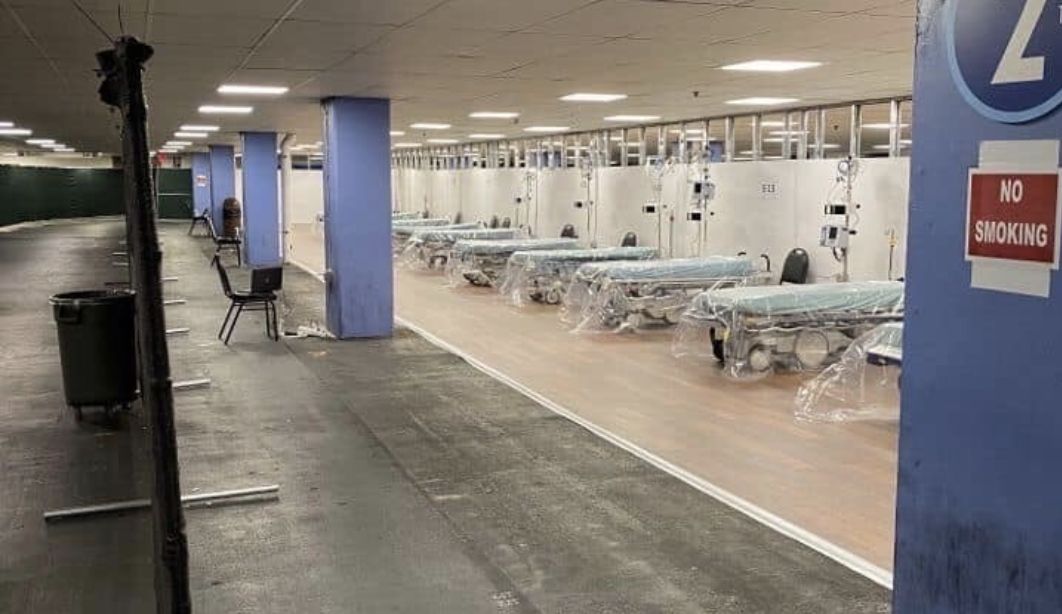PART 1: IT’S GOING TO GET BAD.
Picture descriptions: (1) Makeshift COIVD-19 ward in a Vanderbilt University Hospital parking garage (2) A COVID-19 patient being transported in isolation gurney (3) Completely masked and gowned health care workers (4) Dr. Alyssa Terk, a pediatric ENT who uses bilateral cochlear implants
We recently released our article on how the Deaf and hard-of-hearing (DHH) should prepare for COVID. Several things have changed in the interim. COVID-19 is turning into a mass casualty event. This is not an alarmist statement. Hospital parking garages are being turned into COVID-19 wards. Supplies of life-support ventilators are almost depleted in some New York City and New Orleans hospitals. Medical professionals and care will be rationed as ventilators, equipment, and medications become scarce. Hospitals will also run out of interpreters and remote interpreting equipment..
If you are admitted to a hospital for COVID-19, you will be confined to a respiratory isolation ward and separated from your loved ones. The experience of a cochlear implant patient, who we’ll call “JP,” will drive this home below. Dr. Ruffin and other experts have discussed JP’s experience and believe that DHH people should prepare beyond our original recommendations. This is because COVID-19 will be a natural disaster. We expect the conditions at hospitals to deteriorate significantly. Hospitals may be completely overwhelmed and be unable to provide you with accommodations for communications. We hope to release these next two articles in the upcoming days.
“JP” is a cochlear implant recipient who was hospitalized for and recently discharged from the hospital with COVID-19. Their experience confirms what we suspected: Accommodations are possible, but they are difficult to obtain even in well prepared hospitals. Read JP’s story and remember that their experience occurred when the system wasn’t stressed.
The hearing issues have been the most challenging. I couldn’t wear my cochlear implant because I’ve been so sick, and it won’t stay on because I can’t sit up. It took several days of working with the teams to try to get better accommodations. Barriers to communications changed daily because hospital protocols were constantly being adjusted to the rapidly declining availability of staff, equipment, and resources. [I noticed that] when you have a hearing loss and people have to repeat so many times, the information becomes much more succinct and you’re given less information.
I could not [bring someone to translate for me] because I am in respiratory isolation with the virus. Doctors are not able to come into the rooms because of the lack of masks here in Seattle. So only nurses can have masks to come in, and even then they are limited. So the doctors needed to do all the consulting by phone. [JP cannot use the phone]. So they finally figured out to do video calls with the phone up close so I could watch their mouth and for the most part that worked okay. But it’s still very very basic information that they have to share in order for me to understand what they are saying, so it’s frustrating that I can’t have better conversations with the doctors because my hearing is so limited. Google translate did work well for me with the nurses when I didn’t understand them. Unfortunately it would not pick up when I tried to use it with the video calls with the doctors. They also had to call my husband to ensure that I actually heard everything correctly.
So I just wanted to encourage everyone that yes it is scary to get the virus, I’m not going to lie. The hospital still is a safe place to be and get help. The staff have gone above and beyond in accommodating me.
SEVERAL LESSONS FROM JP’S EXPERIENCE:
-
Patients can be too sick to keep their hearing equipment physically in place.
-
Being confined to respiratory isolation can break the normal flow of communication accommodations:
-
Respiratory isolation creates physical barriers
-
Masks will not be lowered so that you can lipread
-
Masks are being rationed, so doctors and nurses are limited when they can enter a room. This disrupts normal methods of using communication strategies such as video remote interpreting and even personal speech recognition apps.
-
-
Accommodations did not provide ideal communication. Significant communication barriers continued to limit medical conversations. This occurred despite much work by staff in a busy, but not overwhelmed environment. Healthcare workers naturally respond by communicating less information to increase efficiency. For patients, this makes it harder to make informed decisions.
-
You may be the first patient with severe hearing loss that your healthcare professional has ever had.
NEXT UP: PREPARING FOR THE HOSPITAL IF YOU’RE ORAL (PART 2) OR ASL (PART 3)
We hope to release these next two articles in the upcoming days.
Until then, how can you prepare?
-
See our original article.
-
Ensure that your hospital ward or unit has access to Wi-Fi.
-
Plan further by ensuring that your communication strategy addresses the each of the following scenarios. Assume that the hospital will be unable to provide you with equipment. Assume that you will not be able to reach your advocate (spouse or person with decision making capacity).
-
Communicating when the speaker is at your bedside covered in a mask
-
Communicating when the speaker is outside the room looking through a window.
-
-
The goal of advanced preparation is so that you are ready to communicate when you enter the hospital.
Acknowledgments: Educational audiologist, Tina Childress, AuD, who is a late deafened bilateral cochlear implant user, assisted with this article. Christian Vogler, PhD, provided crucial feedback.

